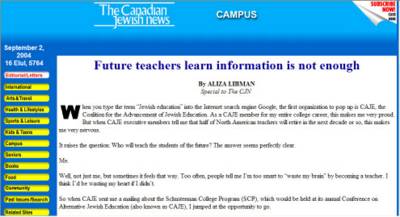On Jewish education

When you type the term “Jewish education” into the search engine Google, the first organization to pop up is CAJE (the Coalition for the Advancement of Jewish Education). As a CAJE member for my entire college career, this makes me very proud. But when CAJE executive members tell me that half of North American teachers will retire in the next decade or so, this makes me very nervous.
Who will teach the students of the future? This is the question. The answer seems perfectly clear.
Me.
Well, not just me, but sometimes it feels that way. Too often, people tell me I’m too smart to “waste my brain” becoming a teacher. I think I’d be wasting my heart if I didn’t.
So when CAJE sent me a mailing about the Schusterman College Program(SCP) which would be held at its annual Conference on Alternative in Jewish Education (also CAJE), I jumped at the opportunity to go.
There I met people who thought differently, acted differently, taught differently and defined “Jewish education” differently than me. But our shared passion was what we all brought to the table.
“This program seeks to unite the totality of Klal Yisrael,” says participant Michael Fel. “Rather than focusing on our differences we focused on the similarities.” Michael, an Hispanic Jew, introduced himself to the group as being from “the voting-impaired city of
Michael was the first Argentinean Jew I’d ever met. Judging from everyone’s reactions to me saying “kilometre” and “eh?”, they hadn’t met too many Canadians.
A primary goal of the 26-student program was for us to work together and talk together and experience community. Talking after the program concluded, third-year
Pluralism means different things to different people. To some participants at CAJE, pluralism is a theory that believes that we grant the validity of other religious denominations as well as our own. To keynote speaker Richard Joel, former director of Hillel International and current president of
But pluralism isn’t a theory. It’s a practise. It’s asking ourselves whether the prayer services will have separate or mixed seating. It’s asking whether there will sing-a-long kumsitzes on Friday night with or without musical instruments. It’s asking ourselves how we accommodate those who are different than us.
One participant expressed dismay to me, because she found out the graduate school she was planning on attending did not accept openly gay students. During our “Think Tank”, where we shared lesson plans on Jewish topics, we explored this topic as we pondered teaching Jewish responses to homosexuality. We also contemplated how to teach about Jewish identity, Jewish music, cults and Jews for Jesus in classrooms, youth groups and camps. We grappled with the question of how to maintain tradition in a world rocked by change.
I answered that question in my vociferous pursuit of methods for the use of drama in my Torah classroom. I attended drama workshops, bought drama books and wondered whether re-enacting the splitting of the sea would make my students relate to it as a piece of their history. I was lucky that CAJE decided to invite representative of Storahtelling, a non-profit group that injects drama and storytelling into ritual services, such as the Shabbat Torah reading.
“It's important to bring life to such an important part of Jewish ritual,” says SCP co-chair and JTS student Lauren Twigg, who was attending her third CAJE. “The Torah is read every week, over and over again. Most of the time people zone out and don't pay attention.”
As students of Jewish education, it is easy to get discouraged. We feel that the community is zoning us out. We think no one is paying attention. At CAJE, it’s clear that that’s wrong.
The truth is, the passion I feel for Jewish education is alive in other people, too. It’s alive in the 1400+ people who came to CAJE this year. It’s alive in the 26 students of SCP who left CAJE vowing to come back next year. It’s alive in Lynn Schusterman and the Schusterman foundation, who believe that education is so important, they’ll bankroll our program.
The secret of Jewish education, of course, is that the material, the texts, the information is not enough. There has to be something more, something that makes parents pay tens of thousands in tuition and drag their kids to Hebrew school at nine on a Sunday morning.
That something more means that I am charged with much more than teaching words on a page. I am charged with teaching students – human Jewish souls who are holy no matter what their nationality, sexual orientation, ability or disability. And I define success by smiling and soul-searching, not dollars and cents.
So I’m glad that when searching for Jewish education, I found CAJE.
Aliza Libman is a fourth-year student of education at

0 Comments:
Post a Comment
<< Home